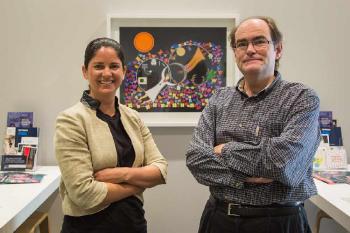Image Caption
By Andrea Smith
Windspeaker.com Contributor
TORONTO
This year’s winner(s) of the prestigious Royal College Dr. Thomas Dignan Indigenous Health Award has been announced.
Dr. Lisa Richardson, an Anishinaabe internist, and Dr. Jason Pennington, a Huron-Wendat surgeon, work as a team and are being recognized for their outreach and advocacy work in Indigenous health, much of which is done through the University of Toronto.
They will officially receive the award during fall graduation convocation.
“While I was in my undergrad, I was quite active with the First Nations community outside of the University of Toronto and with the Native student’s association… As I grew and found my path in medicine, I found from my background I had a different perspective on medicine than western medicine,” said Dr. Pennington, sharing his experience of being one of the only Indigenous students in his medical program (at one point he was the only one, he said).
Dr. Lisa Richardson, too, found that being Indigenous contributed to a unique experience while working her way through school.
“I actually went into biology at McGill University, and then I felt like something was missing from my education. I felt it was quite restrictive, so I ended up studying English literature, as well,” she said.
“It’s this idea of not being limited to the frameworks of bioscience and being able to include other ways of knowing and thinking in my medicine,” said Dr. Richardson, sharing the reason for her drastically different choices of her first two majors.
It was these experiences that led Pennington and Richardson to team up, then co-found the Office of Indigenous Medical Education within the University of Toronto’s Faculty of Medicine. The OIME has served as the base for a number of activities, including being a safe haven for Indigenous students seeking culturally appropriate support.
Pennington and Richardson have also developed an Indigenous Student Applications Pathway at the U of T, to help bring in greater numbers of prospective Indigenous students.
“We have a separate admissions stream for people who self-identify, for Indigenous applications... But people still have to meet our basic cut-offs, so they have to have unbelievable academic performance in order to do that,” said Dr. Richardson, adding the main difference is that other Indigenous people review these applications.
“We have a separate Indigenous sub-committee which consists of Indigenous community members who can interpret an Indigenous person’s activities through an Indigenous lens,” she said.
The other piece Pennington and Richardson are working on currently is bringing cultural safety training to medical students. This means they coordinate classes and seminars which medical students can take to understand exactly how to approach Indigenous patients in their practice, and what their specific needs might be.
“There was very little in the curriculum on Indigenous heath… They talked about higher rates of diabetes and ear infections, and health issues we face, but didn’t talk about the social determinants that led there,” said Pennington. He expands on this by saying there are “social determinants” of health, which for First Nations people include issues related to colonization, the history of Indian Residential Schools, and the 60’s Scoop.
Pennington and Richardson have also developed a new curriculum which sends both Indigenous and non-Indigenous students out into the Toronto area community to meet with Indigenous people, hear their stories, and participate in cultural activity—learning about both the good and the bad.
“They get to go out to different Indigenous organizations in Toronto, like the Native Child and Family Services, or the Native Canadian Center… They might go to a meeting class, or a social,” said Dr. Pennington. “It’s to really see our community in action, and a get a real sense of it… Most of them say this is really transformative,” he said.
Both Dr. Pennington and Dr. Richardson say they are extremely flattered and humbled by their award. But they each believe there is more work yet to do.
Richardson also believes the fact that she and Pennington choose to work together is a clear demonstration that they take influence from traditional Indigenous culture, rather than typical western culture, which is often more hierarchical, she said.
“I know Tom (Thomas Dignan) and I’m so honored to be getting an award named after him… And it’s really interesting that the Royal College was opened to giving us the award together, because we do have quite a different model,” said Richardson.
“We share the position we have. Which you can imagine is not common, especially in an old-school institution like the University of Toronto,” she said
The Dr. Thomas Dignan Indigenous Health Award was established in 2014 in honour of Thomas Dignan, chair of the Royal College Indigenous Health Advisory Committee. For more information on the award go to: http://www.royalcollege.ca/rcsite/awards-grants/awards/royal-college-dr-thomas-dignan-indigenous-health-award-e

